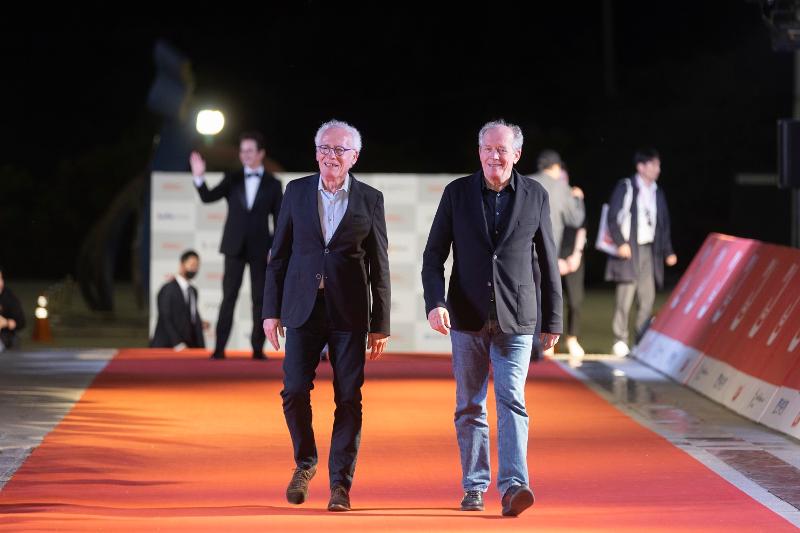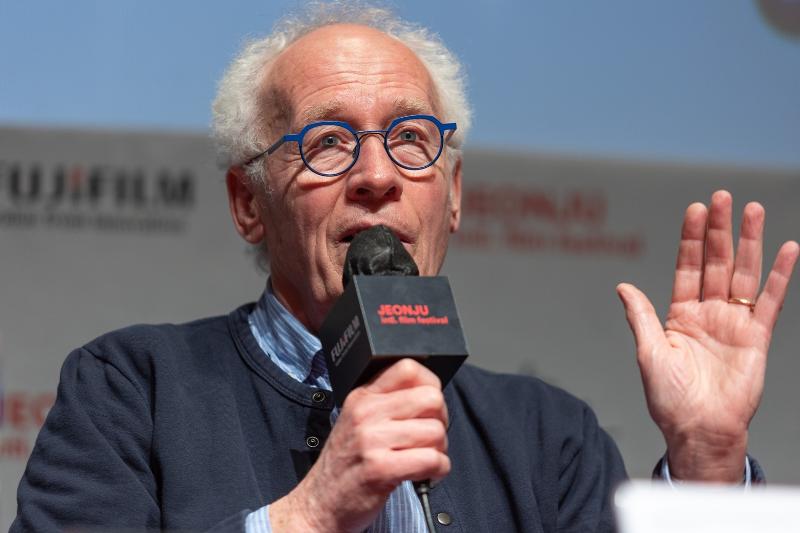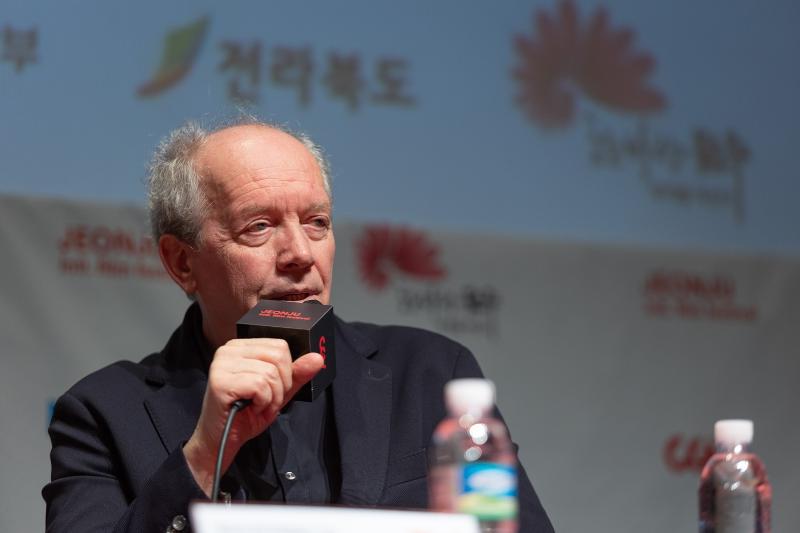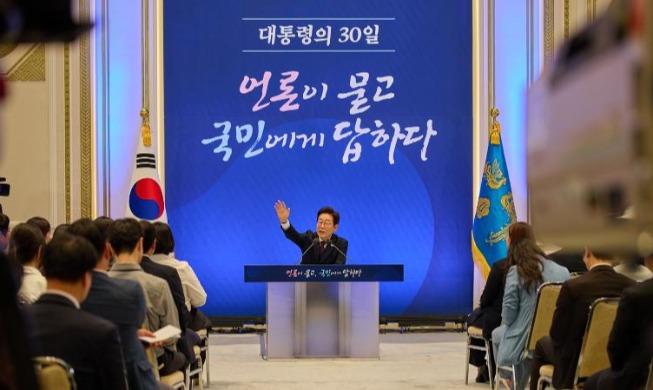- 한국어
- English
- 日本語
- 中文
- العربية
- Español
- Français
- Deutsch
- Pусский
- Tiếng Việt
- Indonesian

The brother director team of Jean-Pierre (left) and Luc Dardenne on April 27 walk the red carpet at the opening ceremony of the 24th Jeonju International Film Festival at Moak Hall of Sori Arts Center in Deokjin-gu District of Jeonju, Jeollabuk-do Province.
By Jung Joo-ri and Charles Audouin
Photos = Jeonju International Film Festival
The Belgian director team of brothers Jean-Pierre, 72, and Luc Dardenne, 69, both of whom won the Palme d'Or Prize, the top honor at the Cannes Film Festival, for "Rosetta" (1999) and "The Child" (2005), have visited Korea for the first time.
Their work "Tori and Lokita" (2022), which won the Anniversary Prize in Cannes last year, is the opening film for the 24th Jeonju International Film Festival in Jeonju, Jeollabuk-do Province.
Since the 1970s, the siblings have produced documentary-like films featuring working-class and immigrant issues in Belgium. Starting with their debut film "Falsch" released in 1986, they focus on people left behind by society including those in poverty and with no job, minors from juvenile detention centers and homeless people.
The Dardennes' ties with the Jeonju festival date back to 2019, when they were invited to the event for the first time and planned an exhibition for the film "Young Ahmed" (2019). Though the COVID-19 pandemic derailed this appearance, they arrived at the festival four years later.
Korea.net spoke to the brothers twice, first at their news conference for "Tori and Lokita" at Jeonju Cine Complex on April 27 and second at a roundtable interview held at the Best Western Plus Hotel the following day. The two conversations lasted over three hours combined, and the pair answered each question with warm smiles and a thoughtful attitude.
The following are excerpts from Korea.net's exclusive interview.

Director Jean-Pierre Dardenne on April 27 answers a question at a news conference for the opening ceremony of the Jeonju International Film Festival at Jeonju Cine Complex in Wansan-gu District of Jeonju, Jeollabuk-do Province.
This is the first time to visit Korea for both of you.
Jean-Pierre: Yes. Most of our films were introduced to Korea and a special exhibition was prepared, so we planned to come here before the COVID-19 pandemic, but it was canceled. And yet, here we are now. I wanted to see Korea with my own eyes because all I'd seen of the country came from movies.
Luc: I'm really happy to be in Korea. What stood out most was the people's faces, not things like buildings. I felt Koreans welcomed us based on their facial expressions. I got the impression that Koreans are highly interested in outsiders and that their culture is not closed. My feeling was that the country is open to the outside world.
What Korean movie is imbedded in your memory?
Jean-Pierre: Many talented directors are from Korea. I was especially impressed by the works of director Lee Chang-dong, whose films are often so realistic. Through the characters, landscapes, cast, plots and rhythms he depicted, I could discover and meet Korea through cinema. A movie is a story capturing the rhythm of a country or its people. In particular, "Secret Sunshine" (2007) and "Poetry" (2010) made me keep an eye on the rhythm in the dialogues and silences between characters.
Luc: I also like every work by Lee. The same goes for "Parasite" directed by Bong Joon-ho. Yet I feel Lee's films are more memorable because of their realism. His movies cannot be categorized into specific genres. They don't follow the general codes of genres such as thriller or film noir. As for the actors, I was most impressed with Yun Jung-hee in "Poetry" and Jun Jong-seo in "Burning" (2018).
Isn't it difficult to make movies together?
Luc: We do every project together. There's no feud or fight. We jointly create the structure and then write the script, shoot, rehearse and edit. We've done this together since our first work, so no problems arise. I don't know why but it's always been this way. I think it's because we grew up with the same parents (laughs).

Director Luc Dardenne on April 27 answers questions at a news conference for the opening ceremony of the 24th Jeonju International Film Festival at Jeonju Cine Complex in Wansan-gu District of Jeonju, Jeollabuk-do Province.
Your movies always focus on socially vulnerable people.
Luc: I think this could be related to the industrial city of Seraing in Belgium's Liege province, where we grew up and made films. The city residents were once wealthy but turned poor in the 1970s due to an economic crisis, which hit young people and children hard and produced orphans. Maybe we owe a debt of gratitude to those excluded from the center. Perhaps we do.
Aside from the Jeonju International Film Festival, Seoul will host an exhibition for both of you. Did you expect such a reception from Korean audiences?
Luc: This is very pleasant and surprising. We've always tried to tell stories as universal and open as those by other filmmakers. I think that's how movies should be. So Korean audiences should be interested in "Tori and Lokita." Of course, because we've only been working in Europe, it's new for us to travel the world like to Korea, Brazil, Japan and Peru. Though everyone can relate to our films, we are surprised and happy to see how people worldwide are interested in our works.
What message do you have for Korea.net readers who watch "Tori and Lokita?"
Luc: I want everyone to befriend Tori and Lokita. People have a tendency to feel scared and threatened when encountering foreigners. But before that, I wanted to show the friendship between the two children through this film. I also hope everyone feels friendship with the two. And I wish that you become their friends.
etoilejr@korea.kr
Most popular
- Grammy-winning producer calls Suga of BTS 'amazing artist'
- Animated 'KPop Demon Hunters' tops Netflix charts in 41 markets
- 'Squid Game' events to pump up K-Content Seoul Travel Week
- Reunited BLACKPINK releases video preview of world tour
- 'Universal love, family' themes fuel success of 'King of Kings': director
